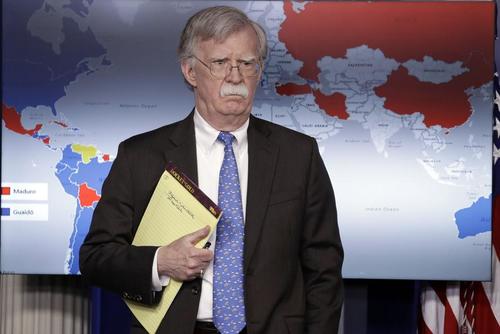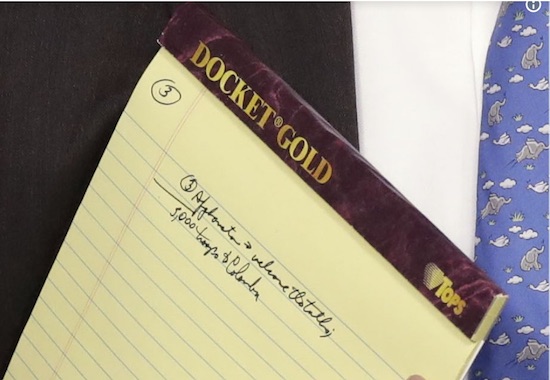
Arthur Siegel Bethlehem-Fairfield shipyards, Baltimore, Maryland. Liberty ship construction. Welding on a hatch assembly at night. 1943

• Cases 73,433 75,197 (+ 1,764 from yesterday)
• Deaths 2,010 (+ 137 from yesterday)
• Second death in Hong Kong
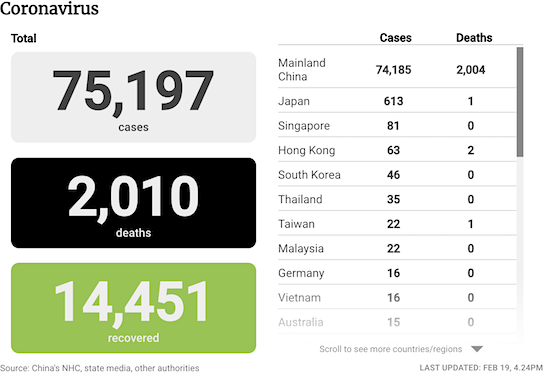

How old do you have to be to count among the “elderly” on a cruise ship?
• Elderly Guests Leave First As Diamond Princess Quarantine Ends In Japan (SCMP)
Passengers on the Diamond Princess cruise ship on Wednesday began disembarking after a controversial two-week quarantine period in Yokohama that raised questions about the Japanese government’s response to the coronavirus outbreak. The disembarkation of nearly 3,000 people was expected to take three days at least, according to the government. In the first group, some 500 mainly elderly passengers who have tested negative for the virus will leave the ship after final check-ups with doctors. The cruise ship was initially carrying about 3,700 passengers and crew from more than 50 countries and regions. The number of cases confirmed on board increased day by day, reaching 542 on Tuesday.
Those found to be infected with the pneumonia-causing virus have been transported to medical facilities. Test samples have now been collected from all passengers, the health ministry said. Disembarking passengers will be transported to Yokohama and other train stations in the area. Those who have had close contact with infected people on the ship will be kept on board for the time being for further monitoring even though they have tested negative. The ship’s operator will decide when crew who have not been infected will leave the ship, according to the ministry. With some passengers planning to stay on the ship it was unclear when their quarantines would end.

“..it was a mess on board, and the mess is now moving off board..”
• Japan Releases First 500 ‘Diamond Princess’ Passengers (ZH)
Japanese health authorities are beginning the process of offloading the remaining 2,000+ passengers and crew aboard the ‘Diamond Princess’, a ship that has been under quarantine for 14 days. The offloading will take place in phases over three days, finally wrapping up on Friday. The first 500 people are set to leave at around 10:30 am Tokyo time on Wednesday. There will be no preference given to different nationalities, according to Japan’s Ministry of Health. Many who depart will be subject to another 14 days of quarantine, including any Americans who elected to stay on the ship instead of traveling back to the US on the evac flight. Roughly 40 Americans were also excluded from that flight because they were being treated for the virus in a Japanese hospital.
So far, 542 people – including at least 14 of the 300 or so Americans who traveled back to the US on Monday in Japan – have tested positive for the virus. And while Japan says it has tested everybody aboard, doctors and experts say there’s no way to certain that people being released won’t be carrying the virus – hence the quarantines when they return home. But where will they go between now and then? And with no immediate after-care plans – at least none that have been publicly disclosed, it looks like Japan is about to set thousands of people aboard the most infected environment outside China loose in Tokyo. Of course, Japanese authorities are so paranoid about the Olympics, one would think they would be doing everything in their power to stop an outbreak in Tokyo, especially at such a sensitive time.
About 500 people are set to leave the ship from around 10:30 a.m. Tokyo time on Wednesday, with no preference given to any particular nationality, Japan’s Health Ministry said. Hopefully, health officials will manage to convince the world that they successfully screened for the virus. The ship was first quarantined on Feb. 5 more than a week after a man who tested positive for the virus in Hong Kong disembarked. Journalists have shared stories of desperation and paranoia from those trapped on the ship, making it sound like such a nightmare that many who read those stories may never want to travel on a cruise.
In other news, Yonhap reported minutes ago that South Korea has another 15 cases, increasing the countries total by roughly one-third to 46 one day after the country’s president warned of an “economic emergency” as companies like Hyundai suffer from supply shortages from China. The South Korean government has already announced a fiscal stimulus package to help companies hurt by the virus.

ACE2, the receptor much more common among Asian people.
• Coronavirus Up To 20 Times More Likely Than Sars To Bind To Human Cells (SCMP)
The deadly new coronavirus is up to 20 times more likely to bind to human cell receptors and cause infection than severe acute respiratory syndrome (Sars), a new study by researchers at the University of Texas at Austin has found. The novel coronavirus and Sars share the same functional host-cell receptor, called angiotensin-converting enzyme 2 (ACE2). The report, published on the website bioRxiv on Saturday, said the new coronavirus had around 10 to 20-fold higher affinity – the degree to which a substance tends to combine with another – for human ACE2 compared with Sars. But the researchers added that further studies were needed to explore the human host-cell receptor’s role in helping the new virus to spread from person to person.
“Compared with SARS-CoV, 2019-nCoV appears to be more readily transmitted from human to human,” the report of the study said. “The high affinity of 2019-nCoV S for human ACE2 may contribute to the apparent ease with which 2019-nCoV can spread from human to human.” The disease caused by the new coronavirus, which the World Health Organisation (WHO) has named Covid-19, has killed more than 1,800 people and infected over 70,000 worldwide. The number of Covid-19 deaths is more than double the global figure of 813 attributed by the WHO to the Sars epidemic of 2002-03.
The new study found that although the novel coronavirus’ receptor-binding domain (RBD) had a relatively similar structure to that of Sars, it did not have appreciable binding to three published Sars RBD-specific monoclonal antibodies (mAbs), which are copies of one type of antibody used to neutralise pathogens. The researchers said this suggested antibody cross-reactivity – the extent to which different antigens appear similar to the immune system – may be limited between the two virus RBDs, meaning Sars-directed mAbs will not necessarily work against the new virus.Instead, they identified the spike protein of coronaviruses, which is essential to gain entry into host cells during the infection process, as the most important target for vaccines, therapeutic antibodies and diagnostics.
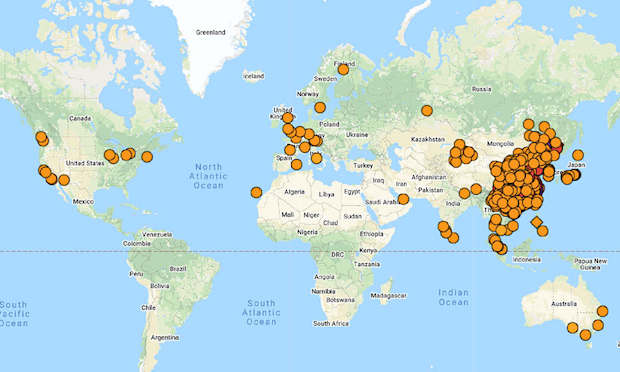

How long before the rest of the world follows?
• Russia To Ban Entry Of Chinese Nationals To Halt Virus (AP)
Russia will temporarily ban Chinese nationals from entering the country due to the virus outbreak centered in China that has infected more than 73,000 people worldwide, Russian authorities said Tuesday. The entry ban goes into effect Thursday at midnight Moscow time (2100 GMT) for an indefinite period, according to a decree signed by Russian Prime Minister Mikhail Mishustin. The government said it took the move due to the “worsening epidemiological situation” in China. Russia already had cut off most Chinese visitors by closing the long land border with China and Mongolia and imposing other travel restrictions. The new entry ban won’t affect travelers who need to transfer flights at Russian airports, authorities said.
So far, Russia has had only three confirmed cases of the COVID-19 disease caused by the virus — two Chinese citizens who were treated and released, and a Russian national infected on the Diamond Princess cruise ship now quarantined in Japan. However, Russian authorities have taken significant steps to try to keep the virus from spreading, including hospitalizing hundreds of people as a precaution after they returned from China. Russia halted most air traffic to China, suspended all trains to China and North Korea, and temporarily stopped issuing work visas to Chinese citizens. Chinese students studying in Russia were told not to return until March 1.

Perspective: 1,500 foreign pilots in 2019, double from 2010. In next 20 years, 6,000 pilots needed every year. Guess they won’t be foreigners.
• Foreign Pilots At Chinese Airlines Return Home On Unpaid Leave (R.)
Foreign pilots at some Chinese airlines have returned to their home countries and are considering other jobs after being placed on unpaid leave as demand falls because of the coronavirus, affected flight crew told Reuters. Meanwhile, Chinese pilots with greater job security said their income has been sharply reduced because most of their pay is based on flying hours. Data firm OAG estimates about 80% of scheduled airline capacity to, from and within China has been cut this week because of SARS-CoV-2, the virus that has killed more than 2,000 people. Chinese airlines have been the hardest hit. Major employers of foreign pilots, including China Southern Airlines and HNA Group’s Hainan Airlines, have acted swiftly to cut their losses, according to pilots and industry experts.
“All the foreign pilots are on leave until the virus situation gets better,” said an expatriate captain at China Southern who, like all of those who spoke to Reuters, requested anonymity because he was not authorized to speak with media. “For the moment we are all in our home countries.” Expats are typically paid more than local staff and work on contracts, which means they are more expendable in a downturn, industry experts said. “We have seen pilots heading back to Australia in January and February due to the stand down and seeking new roles,” said Kirsty Ferguson, the head of Sydney-based airline interview coaching firm Pinstripe Solutions.
[..] the number of foreign pilots flying with Chinese airlines more than doubled to over 1,500 between 2010 and 2019, according the Civil Aviation Administration of China. China will need another 124,000 pilots in the next 20 years, according to Boeing, as an expanding middle class drives demand for air travel. But foreign pilots said being put on leave without pay makes it less likely they’ll return when demand recovers.

Simple really: companies have a few weeks supplies and parts in stock. Then chains start to break.
• Xi Jinping, Under Fire From Virus Outbreak, Also Faces Economic Crisis (CNBC)
Already under heavy fire as the coronavirus outbreak shutters factories, disrupts supply chains and is set to shock China’s already-slowing economy, Chinese President Xi Jinping, it seems, is also under pressure to still deliver the country’s promised growth. In a speech delivered Feb. 3 and released over the weekend, Xi said: “Currently, we still have to deliver this year’s economic and social targets.” Last year, China’s growth dropped to its slowest pace in nearly three decades. Xi, according to a translation of his remarks, said those tasks must still be “done well,” with a message for provinces — other than those most severely affected by the outbreak — to keep a balancing act: Control the epidemic, but make sure they are fulfilling reform and development goals.
The Chinese government could face an “economic crisis” if the outbreak doesn’t abate, The Economist Intelligence Unit (EIU) wrote in a note last Friday, before the Xi speech was published. Public frustration could “escalate dangerously” if the outbreak proves to be uncontrollable by the end of March, EIU wrote. It said the economic costs of China’s shutdown as it seeks to contain the epidemic will be apparent at that point. “At that point, the central authorities will not have room to pin the blame on local officials, given that they will have been directing the crisis response for longer than two months,” the EIU note said, adding it could be why Xi is now taking “more personal control” over the crisis.
Earlier this month, over half of China extended shutdowns to contain the outbreak. Last year, those parts of China accounted for more than 80% of national GDP and 90% of exports. That disruption of the world’s manufacturing hub has severely hit supply chains globally, with companies still dealing with the fallout. As China struggles to get back on its feet, with factories starting to reopen and workers trickling back, progress is slow. Returning workers need to follow quarantine orders, meaning factories are still operating at limited capacity. “Many smaller companies have stated that they will not be able to survive beyond the first quarter of the year in the current business climate,” the EIU wrote. “Besides a health crisis, the authorities could face an economic crisis, with implications for incomes and jobs.”

Throwing in Blagojevich with Stone, Flynn, Manafort. Hmmm.
• Trump Commutes Prison Sentence Of Rod Blagojevich (AP)
U.S. President Donald Trump has gone on a clemency blitz, commuting what he called a “ridiculous” 14-year prison sentence for former Illinois Governor Rod Blagojevich and pardoning former New York Police Department commissioner Bernie Kerik, among a long list of others. Others who got a break from Mr. Trump include financier Michael Milken, who served two years in prison in the early 1990s after pleading guilty to violating U.S. securities laws, and Edward DeBartolo Jr., the former San Francisco 49ers owner convicted in a gambling fraud scandal after building one of the most successful NFL teams in history.
In all, Mr. Trump took clemency actions related to 11 people, his latest interventions in the justice system as he is under growing fire for weighing in on the cases of former aides. Mr. Trump made clear that he saw similarities between efforts to investigate his own conduct and those who took down Mr. Blagojevich, a Democrat who appeared on Mr. Trump’s reality TV show, Celebrity Apprentice. “It was a prosecution by the same people – Comey, Fitzpatrick, the same group,” Mr. Trump said. He was referring to Patrick Fitzgerald, the former U.S. lawyer who prosecuted Mr. Blagojevich and now represents former FBI Director James Comey, whom Mr. Trump fired from the agency in May, 2017.
[..] Mr. Trump said he had yet to think about pardoning his long-time confidant Roger Stone, who is scheduled to be sentenced Thursday, or granting clemency to several former aides who have ended up in legal jeopardy, including his former campaign manager Paul Manafort and disgraced former national security adviser Mike Flynn. “Somebody has to stick up for the people,” Mr. Trump said. As for Mr. Stone, in particular, he added: You’re going to see what happens. I think he’s treated unfairly.”

Their approach to Bernie is similar to that of Trump. But Bernie picks their side when it comes to the latter. That’s his main blind spot: Trump and Russia.
• Fox Has Been “More Fair”: Why Bernie’s Team Has Had It With MSNBC (VF)
Faiz Shakir had seen enough. As summer turned to fall, and the 2020 Democratic presidential race entered the stretch run before the first caucuses and primaries, Shakir, who manages Bernie Sanders’s campaign, approached MSNBC president Phil Griffin to discuss his concerns with the network’s treatment of the Vermont senator’s second White House bid. “We watched a ton of terrible coverage occurring and we thought we’d at least try to address it,” he recalled For months, the campaign bristled at slights from MSNBC’s stable of hosts and commentators. Jason Johnson, an MSNBC contributor, predicted in January 2019 that Sanders would drop out by August, and network analyst Mimi Rocah said in July that Sanders made her “skin crawl.”
On-screen graphics have omitted Sanders and misrepresented his poll numbers, a trend that inspired a sendup from the Onion. “It’s been a struggle to change the tone and the tenor of the coverage that we receive,” Shakir said in an interview. “They’ve been among the last to acknowledge that Bernie Sanders’s path to the nomination is real, and even when it’s become real, they frequently discount it.” (A study from progressive magazine In These Times buttresses Shakir’s critique). Sanders also attended the off-the-record discussion with Griffin; an MSNBC spokesperson said the network has hosted similar meetings with other Democratic candidates. Shakir said the 30 Rock chat was “open” and “cordial,” but now, months later, he’s “not sure it really changed anything.”
Sanders has long contended that the agenda of “corporate media” doesn’t necessarily reflect the people’s needs, and his 2020 campaign has doubled as a rolling media criticism shop. On Twitter, Sanders’s speechwriter David Sirota, a veteran reporter, has become a one-man rapid-response machine; last week, he chided a New York Times reporter for downplaying Sanders’s victory in the New Hampshire primary. Several key campaign figures hail from the media’s left flank: deputy campaign manager Ari Rabin-Havt (Media Matters), national press secretary Briahna Joy Gray (The Intercept), and Shakir (ThinkProgress). Sanders himself has suggested that the Washington Post “doesn’t write particularly good articles about” him because of his efforts to raise the minimum wage at Amazon, the company founded by the newspaper’s owner, Jeff Bezos. He’s also railed against networks taking Big Pharma ads while on the debate stage.
Entering Wednesday’s debate in Las Vegas, which will be cohosted by MSNBC and NBC News, the ongoing tension between the titular liberal cable news network and the current Democratic front-runner has only intensified, and appears symptomatic of generational and ideological rifts within the party. It is at once a test of both MSNBC’s influence over the process and Sanders’s ability to withstand establishment resistance. Shakir said unflattering coverage on MSNBC has been “actively damaging” to the campaign. “The constant diminishment of Bernie Sanders on MSNBC,” he added, “hurts his case for electability.”

1) “..medical costs for a couple are estimated to be $200,000 during their retirement years..”
2) 70-80% of Americans live paycheck to paycheck.
3) Nuff said.
The pension Ponzi will grind to a halt. And as these things go, that will happen sooner than you expect.
• The Magic Of Retirement Is Gone (Alhambra)
Social Security hasn’t considered 65 as full retirement age for a long time. The last workers who received full Social Security benefits at that age were born in 1937. For people born in 1938 and beyond, full retirement age has been increasing by 2 months per year up to those born in 1960 and after, when full retirement age caps at 67. According to the Bureau of Labor Statistics, in 2016, almost 27% of Americans between 65 and 74 were still working. That’s projected to exceed 30% by 2026. And the number of people 75 and older who continue to work has gone from 6.4% in 2006 to 8.4% in 2016, projected to hit almost 11% by 2026. Why is it happening? Some people continue working to have something to do. I’ve talked to people still in the workforce, and some who retired and went back to work.
They say, “There’s only so much golf you can plan and so many fish you can catch.” They were bored. They needed something to do. Some continue to work so they’ll have health insurance. But the majority of people still working are doing it because they have to. The Government Accountability Office (GAO) reports that almost 29% of households age 55 and older don’t have anything saved for retirement and they don’t have a pension. The National Institute on Retirement Security calculated the number. That means 40 million U.S. households have no retirement savings at all. The Employee Research Institute estimates that all households with a head of household between 25 and 64 years old, cumulative, are $4.3 trillion short of what they need for retirement.
Among households that do have retirement accounts, The Federal Reserve found the median account balance was $60,000. When you consider medical costs for a couple are estimated to be $200,000 during their retirement years—Not Good. Numbers from the Social Security Administration (SSA) show 50% of retired couples and 70% of unmarried elderly receive 50% of their income from Social Security. Among all Social Security beneficiaries, 21% of married couples and 45% of unmarried persons rely on Social Security for 90% of their income.

“Boeing produced some 400 MAX planes since the grounding..” Well, no more. Maybe the workers were thinking: those planes will never be delivered anyway.
• Boeing Finds Debris In Fuel Tanks Of Undelivered 737 MAX Planes (CNBC)
Boeing has told employees that it discovered foreign-object debris in fuel tanks of “several” 737 Max planes the manufacturer has in storage, CNBC learned Tuesday. Foreign object debris “is absolutely unacceptable,” Boeing Commercial Airplanes executive Mark Jenks, a vice president and general manager of the 737 program and Renton production facility, according to the company’s website, said in a note to employees. “One escape is one too many. “With your help and focus, we will eliminate FOD from our production system,” he wrote. The company plans to investigate the foreign objects in the tanks and said that the discovery won’t impact the plane’s return to service.
“The success of this initiative is dependent on you. We need our entire team to make this a priority. Thank you for your commitment to put safety, quality and integrity into everything we do,” Jenks wrote. The Federal Aviation Administration said it was aware that Boeing “is conducting a voluntary” inspection for debris in the undelivered aircraft “as part of the company’s ongoing efforts to ensure manufacturing quality.” “The agency increased its surveillance based on initial inspection reports and will take further action based on the findings,” the agency said in a statement. Boeing also plans to inspect all undelivered 737 Max planes. Boeing produced some 400 Max planes since the grounding last year until it halted production last month. The company suspended delivery of the new planes after regulators grounded them worldwide ..

He signed up for the trial.
The CIA “dosed” him over 50 times.
“He didn’t murder prior to the LSD. His brain may have been altered..”.
But his lawyers never brought up LSD in his trial.
• After Learning Of Whitey Bulger LSD Tests, Juror Has Regrets (AP)
One of the jurors who convicted notorious crime boss James “Whitey” Bulger says she regrets her decision after learning that he was an unwitting participant in a covert CIA experiment with LSD. Bulger terrorized Boston from the 1970s into the 1990s with a campaign of murder, extortion, and drug trafficking, then spent 16 years on the lam after he was tipped to his pending arrest. In 2013, Janet Uhlar was one of 12 jurors who found Bulger guilty in a massive racketeering case, including involvement in 11 murders, even after hearing evidence that the mobster was helped by corrupt agents in the Boston office of the FBI. But now Uhlar says she regrets voting to convict Bulger on any of the murder charges.
Her regret stems from a cache of more than 70 letters Bulger wrote to her from prison. In some, he describes his unwitting participation in a secret CIA experiment with LSD. In a desperate search for a mind control drug in the late 1950s, the agency dosed Bulger with the powerful hallucinogen more than 50 times when he was serving his first stretch in prison — something his lawyers never brought up in his federal trial. “Had I known, I would have absolutely held off on the murder charges,” Uhlar told The Associated Press in a recent interview. “He didn’t murder prior to the LSD. His brain may have been altered, so how could you say he was really guilty?” At the same time, Uhlar says she would have voted to convict Bulger on the long list of other criminal counts, meaning he still would likely have died in prison.
Uhlar has spoken publicly about her regret before but says her belief that the gangster was wrongly convicted on the murder charges was reinforced after reading a new book by Brown University professor Stephen Kinzer: “Poisoner in Chief: Sidney Gottlieb and the CIA Search for Mind Control.” The book digs into the dark tale of the CIA’s former chief chemist and his attempts to develop mind control techniques by giving LSD and other drugs to unsuspecting individuals, including colleagues, and observing the effects. [..] Gottlieb’s secret program, known as MK-ULTRA, enlisted doctors and other subcontractors to administer LSD in large doses to prisoners, addicts and others unlikely to complain. In Bulger’s case, the mobster and fellow inmates were offered reduced time for their participation and told they would be taking part in medical research into a cure for schizophrenia.

I get the idea. But I don’t get which EU companies this is supposed to help.
• EU To Unveil Plans To Boost European Firms, Rein In US Tech Giants (R.)
The European Commission will on Wednesday launch the first of a raft of proposals to help European companies exploit their rich trove of industrial data and at the same time rein in online giants Facebook Inc, Alphabet Inc’s Google and Amazon.com Inc . The data strategy and artificial intelligence discussion papers are part of a bigger scheme to help European companies better compete with U.S. tech giants and state-aided Chinese companies in the digital world. European digital and antitrust chief Margrethe Vestager and European industry chief Thierry Breton will present the proposals around noon. They will come up with a final draft by the end of the year following feedback from interested parties.
The core of the EU’s data strategy is the creation of a single European data market and smaller data markets centered on key industries, according to a draft seen by Reuters last month. Other elements include new rules covering cross-border data use, data interoperability and standards related to manufacturing, climate change, the auto industry, healthcare, financial services, agriculture and energy. One of the possibly controversial proposals calls for doing away with EU competition rules against anti-competitive data sharing. In response to complaints about the power wielded by large online platforms, the Commission is also considering introducing rules to stop these companies from unilaterally imposing conditions for access and use of data or benefiting from this in a disproportionate manner.

Twitter comment: “The Parthenon marbles don’t speak English so under the latest post-Brexit immigration guidelines they wouldn’t have been allowed into the UK from the EU anyway.”
But seriously, how do you defend buying stuff from the Nazis, or any occupying force, and then claim that’s legal?
• Britain’s Row With Greece Over Treasures Spills Into Brexit Tensions (R.)
The British Museum in London has refused to return the Parthenon Marbles, 2,500-year-old sculptures that British diplomat Lord Elgin removed from Athens in the early 19th century when Greece was under Ottoman Turkish rule. A draft of the 27 EU nations’ position on negotiations with Britain on their future relationship, which was seen by Reuters on Tuesday, seeks the “return or restitution of unlawfully removed cultural objects to their countries of origin”. The document did not specify any cultural objects. However, an EU diplomat said the line was added at the request of Greece, with support from Italy.
Greece’s culture minister said last month that Athens would step up its campaign for the return of the Parthenon Marbles from London and expected to win more support from European peers as Brexit diminishes Britain’s influence. The British Museum says the marbles, which are roughly half of a 160-metre frieze that adorned the fifth century BC Parthenon temple, were acquired by Elgin under a legal contract with the Ottoman empire. Greece says they were stolen. A British government spokeswoman, commenting on the draft EU document, said the UK’s position on the sculptures remained that they are “the legal responsibility of the British Museum”.
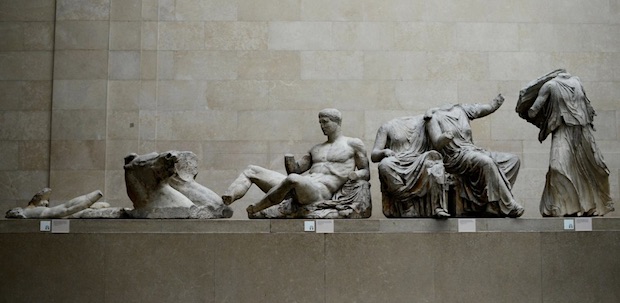
The Parthenon Marbles displayed at the British Museum in London October 16, 2014. REUTERS/Dylan Martinez/

John Gray begins his book, Black Mass (2007), with the sentence: “Politics Is A Chapter In The History Of Religion.”
Hazel Henderson Said In 2006: “Economics, Never A Science, Has Always Been Politics In Disguise.”
• Religion is a Repeating Chapter in the History of Politics (CP)
In 1949 the German philosopher Karl Jaspers coined the term ‘the axial age’ in his book, ‘The Origin and Goal of History.’ He defined the Axial Age as the pivotal period in human moral and spiritual development that has conferred upon the world the political, cultural and philosophical shape it has today. It occurred, according to Jaspers, between 2 and 3 thousand years ago in various places around the world. This pivot point in history comes after the emergence of the State and civilization in these areas, which current anthropological and archaeological thinking sets at about 5 to 6 thousand years ago.
What Jaspers and other historians had noticed in studies of ancient history was that over a relatively short span of time all the great founding philosophies or systems of morality that we still refer to today – such as Daoism, Confucianism, Buddhism, Zoroastrianism, Platonism, the Abrahamic religions – appeared in parallel, with no obvious connection, in different civilizations.
Jaspers looked for reasons for this ancient ‘enlightenment’ in the political situations of the various civilizations he analysed and suggested the opportunity for new thinking was provided in each area by the destabilization of the previous, originary, monolithic, State and the formation of smaller, competing States that were in a process of navigating a new course for themselves and in relation to adjacent territories. Several of the founding philosophers, for example, are known to have wandered around their region, disseminating their ideas in the cities and districts of different States.

If Martin Scorsese made horror movies…


The Automatic Earth cannot survive without your Paypal and Patreon donations. If you read us, please support us.







